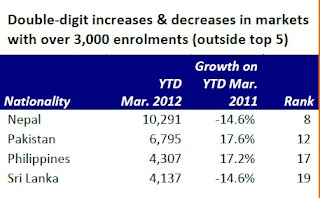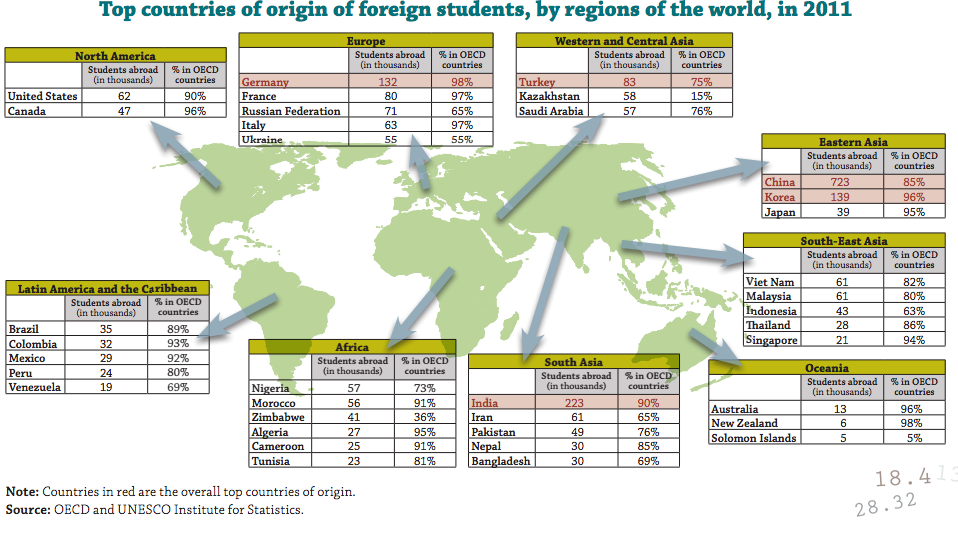PakAlumni Worldwide: The Global Social Network
The Global Social Network
Australia Beckons Growing Numbers of Pakistani Students
While the overall foreign student population in Australia has declined this year, the number of Pakistanis studying in Australia is continuing double-digit growth, according to recent Australian government data on international education. Pakistan has now become the top growth market for Australia's struggling international education industry, even though revenue from its neighbor India fell almost $1 billion in a single year, according to The Australian newspaper. New Australian Bureau of Statistics figures reveal that Australia's fourth-biggest export industry is turning to new markets to counter a $2.2bn loss of revenue last year.
Australia's earnings from the top 12 foreign markets all fell last year, topped by India, which slumped by 37 per cent, but Pakistan bucked the trend, with revenue rising 15 per cent to $253 million.
 Australian international education revenue from Pakistan has been rising, more than tripling over the past five years. Earnings from the boom-bust Indian market are down 50% in two years, collapsing from a 2009 peak of $3.1bn.
Australian international education revenue from Pakistan has been rising, more than tripling over the past five years. Earnings from the boom-bust Indian market are down 50% in two years, collapsing from a 2009 peak of $3.1bn.
Although the growth in the total number Pakistanis studying abroad has slowed since the terrorist attacks of Sept 11, 2001 in the United States, the world's sixth most populous nation continues to be among the leading sources of foreign students in America, Europe, Australia and new emerging higher education destinations in Asia.
 |
| Source: Economist Magazine |
As the number of Pakistani students in the United States has declined from a peak of 8,644 students (ranked 13th) in 2001-02 to 5,222 in 2009-10 (ranked 23rd), English-speaking OECD nations of the United Kingdom and Australia have become the biggest beneficiaries getting increasing market share of the Pakistan education market. Both nations have benefited in spite of the fact that the UK and Australian visa rejection rates for Pakistanis are higher than for students from other nations.
With rising urban middle class, there is substantial and growing demand in Pakistan from students, parents and employers for private quality higher education, including vocational training, along with a willingness and capacity to pay relatively high tuition and fees, according to the findings of Austrade, an Australian govt agency promoting trade. Private institutions are seeking affiliations with universities abroad to ensure they offer information and training that is of international standards.
Trans-national education (TNE) is a growing market in Pakistan and recent data shows evidence of over 40 such programs running successfully in affiliation with British universities at undergraduate and graduate level, according to The British Council. Overall, the UK takes about 65 per cent of the TNE market in Pakistan.
A common concern about Pakistani students is that they might not return to serve their country. I think this is a genuine concern but it is often overblown. Pakistanis with advanced training are helping their country of origin in many ways. Those who are living and working overseas send significant amounts of money home to help Pakistan's economy. Others contribute their know-how by returning home as doctors, engineers, professors and other professionals and technocrats on a permanent basis or by frequent working visits.
Examples of foreign-educated Pakistanis who are directly contributing to the nation include a Fulbright computer science scholar who has returned home to help fight terror, a plastic surgeon helping victims of acid attacks, a heart surgeon setting up a hospital in a remote Pakistani village, successful business executives, scientists, university professors and deans, current central bank governor, current finance minister and thousands of others.
It is extremely important for Pakistan's public policy makers and the nation's private sector to fully appreciate the expected demographic dividend as a great opportunity to turn the nation's fortunes for the better. The best way for them to demonstrate it is to push a pro-youth agenda of education, skills development, health and fitness to take full advantage of this tremendous opportunity. Failure to do so would be a missed opportunity that could be extremely costly for Pakistan and the rest of the world.
Related Links:
Pakistan's Expected Demographic Dividend
Pakistani Graduation Rate Higher Than India's
India and Pakistan Contrasted in 2011
Educational Attainment Dataset By Robert Barro and Jong-Wha Lee
Quality of Higher Education in India and Pakistan
Developing Pakistan's Intellectual Capital
Intellectual Wealth of Nations
Pakistan's Story After 64 Years of Independence
Pakistan Ahead of India on Key Human Development Indices
Scholarships at Foreign Universities
Institute of International Education--Open Doors
-
Comment by Riaz Haq on June 25, 2023 at 8:28pm
-
Nearly 21,000 students from Pakistan as international students return to Australia but not yet at pre-pandemic levels
https://monitor.icef.com/2023/04/international-students-are-returni...
Short on time? Here are the highlights:
Australia’s international student numbers and overall enrolments were up in 2022, but they have not yet reached their levels before the pandemic in 2019
The Chinese market is not rebounding, and Indian students now account for more commencements (first-time enrolments) than Chinese students do
Driving the Australian international education sector’s recovery are new students from Thailand, Nepal, Colombia, Pakistan, and other emerging markets
-------
Australia’s international education sector is recovering from pandemic losses, but it has not rebounded to pre-pandemic performance yet according to new data from Austrade.
Australian institutions enrolled 619,370 foreign students in 2022. This is up 8% over 2021 but is down 18% since 2019.
Commencements (first-time enrolments in Australian programmes) grew by 39% y-o-y but were 23% lower than in 2019. Fewer new Chinese students depressed commencement volumes: there were 39% fewer Chinese students in 2022 than in 2019. In 2022, India displaced China as the largest source of commencements.
Total course enrolments (as distinct from total international students) nudged upwards by 4% to 746,390 in 2022, but this is 22% lower than in 2019. (Australia provides data on both international students and international enrolments – the second is always a higher number as an international student may enrol in more than one course while on their study visa.)
----------
Offsetting a decline in Chinese enrolments (177,470 in 2022, down 11% y-o-y) and zero momentum from India (128,980, up .03%) were notable enrolment increases from:
Thailand, the 6th largest market, up 61% to 25,792
Nepal, the 3rd largest market, up 21% to 71,805
Colombia, the 4th largest market, up 21% to 28,435
Pakistan, the 9th largest market, up 21% to 20,935
Combined, China and India still contributed half of all international enrolments in Australian institutions in 2022.
Foreshadowing the shape of the sector’s recovery in the years to come are commencement trends. Chinese commencements fell by 8% in 2022 compared with 2021, while Indian commencements increased by 45%, boosting India to the top market for Australia in terms of first-time enrolments in courses. Otherwise, the biggest stories in terms of commencements come from:
Thailand, up 145%
Nepal, up 94%
Pakistan, up 71%
Philippines, up 61%
In 2022, India and China each accounted for roughly 18% of commencements, with Nepal next at 11%.
-
Comment by Riaz Haq on September 2, 2023 at 7:37am
-
From Google Gen Ai:
Studying in Europe offers Pakistani students access to world-renowned institutions, innovative teaching techniques, and multicultural surroundings. In 2019, nearly 10,000 Pakistani students registered in European colleges.
The number of Pakistani students studying abroad has grown steadily over the past decade. In 2020, 64,604 Pakistani students were studying abroad.
Some of the top countries for Pakistani students to study abroad include:
The United States, The United Kingdom, Canada, Australia, Germany, New Zealand, Malaysia, France, Singapore, Sweden.
Some of the top destinations for Pakistani students in Europe include:
Germany
Austria
Sweden
The United Kingdom
Pakistani students are required to pass language tests to study abroad. However, some universities offer scholarships that allow students to study in Europe without IELTS.
Comment
- ‹ Previous
- 1
- 2
- Next ›
Twitter Feed
Live Traffic Feed
Sponsored Links
South Asia Investor Review
Investor Information Blog
Haq's Musings
Riaz Haq's Current Affairs Blog
Please Bookmark This Page!
Blog Posts
Pakistanis' Insatiable Appetite For Smartphones
Samsung is seeing strong demand for its locally assembled Galaxy S24 smartphones and tablets in Pakistan, according to Bloomberg. The company said it is struggling to meet demand. Pakistan’s mobile phone industry produced 21 million handsets while its smartphone imports surged over 100% in the last fiscal year, according to …
ContinuePosted by Riaz Haq on April 26, 2024 at 7:09pm
Pakistani Student Enrollment in US Universities Hits All Time High
Pakistani student enrollment in America's institutions of higher learning rose 16% last year, outpacing the record 12% growth in the number of international students hosted by the country. This puts Pakistan among eight sources in the top 20 countries with the largest increases in US enrollment. India saw the biggest increase at 35%, followed by Ghana 32%, Bangladesh and…
ContinuePosted by Riaz Haq on April 1, 2024 at 5:00pm
© 2024 Created by Riaz Haq.
Powered by
![]()



You need to be a member of PakAlumni Worldwide: The Global Social Network to add comments!
Join PakAlumni Worldwide: The Global Social Network